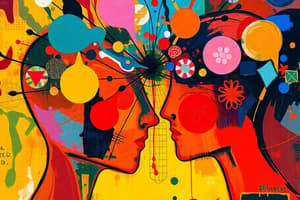Podcast
Questions and Answers
Emotion and motivation are the same constructs.
Emotion and motivation are the same constructs.
False (B)
Emotion involves feelings and physiological responses.
Emotion involves feelings and physiological responses.
True (A)
Motivation is the energy that gives direction to behavior.
Motivation is the energy that gives direction to behavior.
True (A)
Basic emotions include joy, surprise, and disgust.
Basic emotions include joy, surprise, and disgust.
Emotions cannot be elicited by social interactions.
Emotions cannot be elicited by social interactions.
Motivation can only be driven by external factors.
Motivation can only be driven by external factors.
Emotion and motivation are the same concepts.
Emotion and motivation are the same concepts.
Motivation influences emotions in individuals.
Motivation influences emotions in individuals.
Understanding the relationship between emotion and motivation is not important.
Understanding the relationship between emotion and motivation is not important.
Emotion cannot stimulate motivation in individuals.
Emotion cannot stimulate motivation in individuals.
Study Notes
Introduction
Emotion and motivation are fundamental aspects of human behavior. They influence our thoughts, actions, and interactions with the world around us. While often used interchangeably, emotion and motivation are distinct constructs. Emotion is a complex reaction pattern that involves feelings, behaviors, and physiological responses, while motivation is the impetus that gives purpose or direction to behavior. In this article, we will explore the relationship between emotion and motivation, their similarities, and their differences.
Emotion
Emotion is a complex psychological experience that involves feelings, behaviors, and physiological responses. It is a multifaceted construct that can be defined as a combination of cognitive, behavioral, and physiological components. In psychology, emotions are often categorized into basic emotions such as anger, fear, sadness, happiness, surprise, and disgust. These emotions serve various functions, including signaling danger, expressing social connections, and guiding decision-making.
Emotions can be elicited by various stimuli, including environmental factors, social interactions, and internal states. They are often associated with specific physiological responses, such as changes in heart rate, blood pressure, and facial expressions. These physiological responses are part of the autonomic nervous system's response to emotional experiences.
Motivation
Motivation is the force or energy that gives purpose or direction to behavior. It operates at both a conscious and unconscious level in humans. Motivation can be driven by internal factors, such as an individual's needs, desires, and goals, or by external factors, such as rewards, punishments, and social influences.
Motivation is an essential component of human behavior, influencing our actions and decision-making processes. It can be conceptualized as a drive or a desire to achieve a particular goal, which can range from basic physiological needs to more complex social and cognitive goals.
The Relationship between Emotion and Motivation
Emotion and motivation are closely related, but they are distinct constructs. Emotion can stimulate motivation by providing a sense of urgency or importance to a goal. For example, experiencing fear or anger can motivate an individual to take action to avoid danger or confront an antagonist. On the other hand, motivation can also influence emotions by shaping the way an individual perceives and responds to emotional experiences. For example, feeling motivated to achieve a goal can lead to greater feelings of happiness and satisfaction when the goal is achieved.
Conclusion
Emotion and motivation are two distinct but interconnected constructs that play crucial roles in human behavior. Emotion can stimulate motivation by providing a sense of urgency or importance to a goal, while motivation can influence emotions by shaping the way an individual perceives and responds to emotional experiences. Understanding the relationship between emotion and motivation is essential for gaining insight into human nature and developing effective strategies for personal and social change.
Studying That Suits You
Use AI to generate personalized quizzes and flashcards to suit your learning preferences.
Description
Explore the intricate relationship between emotion and motivation, two fundamental aspects of human behavior. Learn about the distinctions, similarities, and how they influence each other in shaping our thoughts, actions, and interactions. Gain insights into how emotion can stimulate motivation and how motivation can shape emotional experiences.




